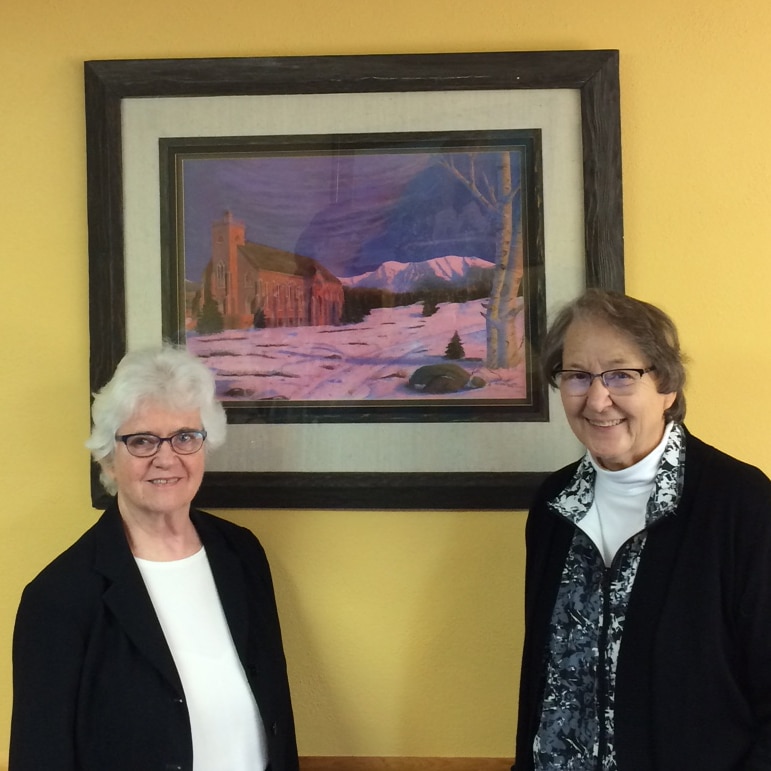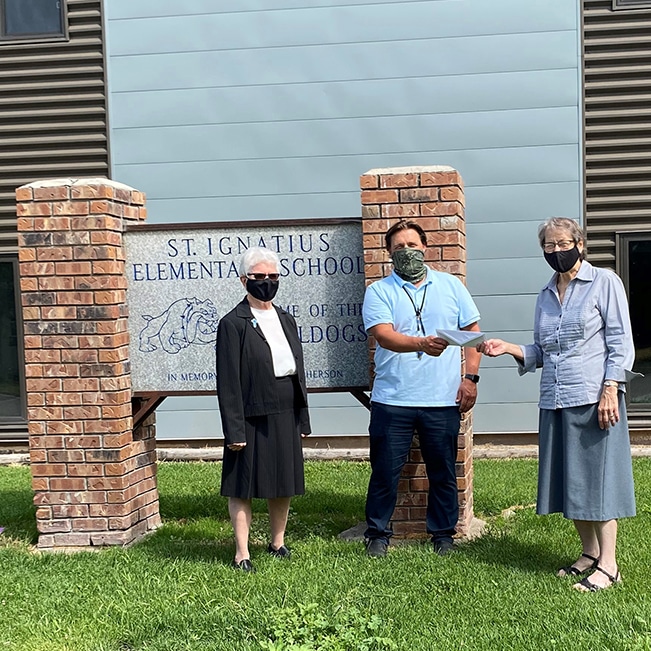Catholic Social Teaching Guides Our Lives as Vowed Women of the Catholic Church
As we take inventory of the condition of our world, we raise our voices to say that the people among us who are the most in need, who are most vulnerable, need to have our attention and they need to have supportive resources. We pledge to hold the needs and concerns of all in a contemplative space, in the heart of a loving and ever faithful God. We recommit ourselves to the Gospel call to welcome the stranger, care for creation, establish economic justice, abolish every form of modern-day slavery, and promote non-violence and just peace– and we pledge to continue to work together with all people of good will to build God’s beloved community in this place we call home. ~ Dominican Sisters~Grand Rapids
“Teach me, O God, your way that I may walk in your truth.”
~ Margaret Hillary OP
 Poverty in the United States is one of the Truths, the realities, Margaret Hillary OP sees up close in her ministry in the western United States. Sister Margaret with Edith Schnell OP walks in faith and community with the people of St. Ignatius Parish in Montana through catechetical and faith in action education and community outreach.
Poverty in the United States is one of the Truths, the realities, Margaret Hillary OP sees up close in her ministry in the western United States. Sister Margaret with Edith Schnell OP walks in faith and community with the people of St. Ignatius Parish in Montana through catechetical and faith in action education and community outreach.
“Here, the people are impoverished for lack of material goods and services many take for granted. Jobs and educational opportunities are scarce; the hardship of making ends meet during the COVID-19 pandemic has hit our families and seniors especially hard,” says Sr. Margaret, who works with children and families on the Flathead Indian Reservation. “I admire the Native people, for in the face of difficulties they pray for strength and then courageously move forward searching for ways to overcome the issues.”
Caretakers of the Earth
“I describe indigenous women as spirit filled, brave, robust and resilient,” says Sr. Edith. “They are natural care takers of earth. As a way of life, they continually reflect on wonders of creation, feed animals, water vegetation, and nurture and admonish children. Here, the women are deeply respected and honored as they teach the younger generation their native language, tribal traditions and cultural values.
“Many of our Catholic Care of Earth teachings reflect the values of indigenous cultures. Every day when I see the beauty of the mountains and the tall evergreen trees, I rejoice in the greatness of God’s creation and thank our Native peoples for preserving nature in its original state.”
“This time of `stay at home’ is very difficult for me,” admits Sr. Edith. “I truly miss the time spent visiting with homebound, praying with each individual, discussing the Sunday liturgical readings and bringing the gift of Eucharist. Some individuals encourage me to stay for a longer period of time, however time is precious, it’s essential for me to get on the road and knock on other doors. During this time of pandemic, a weekly phone call has been a blessing for me and for shut-ins. Together we laugh, pray, chat and enjoy each other’s company via phone lines. We all look forward to the days when we can meet again face to face.”
The women I visit with are reminders of the many others who have nobody checking on their welfare, or whose needs are changing during this world health crisis. My heart goes out to older adults who have no family members to care for their future living needs. Many vulnerable adults have part-time care takers and some may need to leave their comfortable home and move into assisted living or a nursing home. Many of us have dealt with this issue within our own families. At this time, we need to look at this issue globally, as well. So, I am encouraged and grateful that our Marywood complex in Grand Rapids will soon have facilities to help low-income adults and families.”
Life and Learning During a Pandemic

Sisters Margaret Hillary and Edith Schnell were able to donate monies from a Catholic Extension grant to St. Ignatius Elementary School on the Flathead Indian Reservation in Montana to support remote learning during COVID-19.
Like schools nationwide, there has been a shift to online learning at St. Ignatius School and Arlee Schools which both serve young people of the Confederated Salish and Kootenai Tribes. Technology resources are scarce.
With grants from the Catholic Extension, the Sisters were able to offer four mini grants to help educators and students. The Sisters each applied for $500 to benefit children as they return to class and help families who need laptops and WI-FI for virtual learning.
They applied for another $500 each to support two mothers; both suffering increased hardship feeding, caring for, and educating their children, describes Sister Margaret. One, a single mother of three and member of the Confederated Salish and Kootenai Tribe, who had hours cut at work and lost a large percentage of her income. The second is the biological mother of three children, and the legal guardian for six more kids from two different families.
